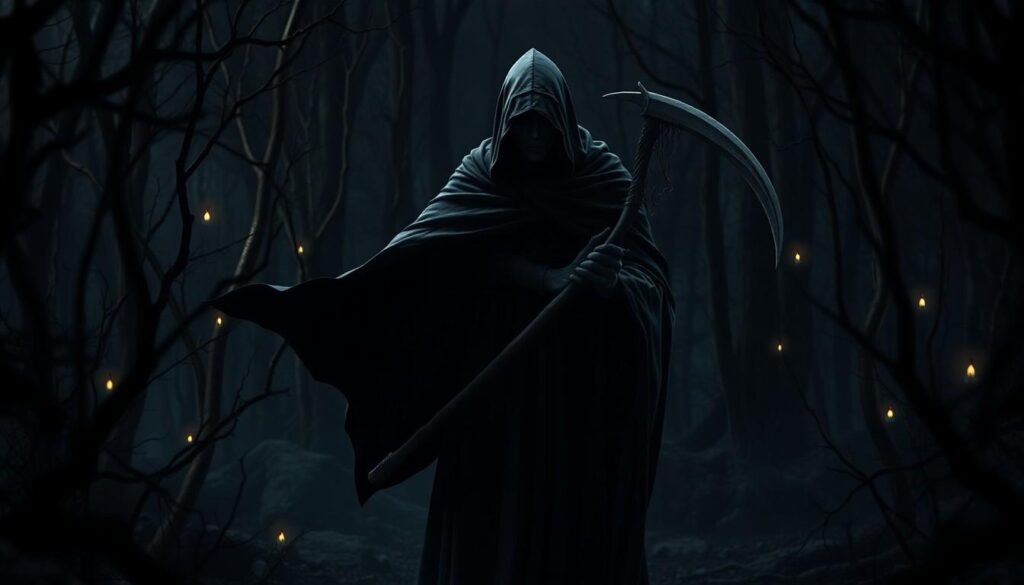Fascinated by the mysterious and profound? Names that embody death and darkness have captivated cultures throughout history, carrying deep symbolic weight and ethereal beauty. From ancient mythology to modern naming trends, these powerful monikers continue to intrigue parents looking for names with depth and significance.
We’ve compiled the most compelling names associated with death, darkness, and the underworld from diverse cultures worldwide. Whether you’re expecting a baby, creating a character, or simply exploring linguistic curiosities, our comprehensive list offers insights into each name’s origin, meaning, and cultural significance. Discover how these hauntingly beautiful names have transcended their ominous origins to become distinctive choices with rich historical connections.
The Mysterious Allure of Dark-Themed Names
Dark-themed names possess a unique magnetism that continues to captivate parents, writers, and creative minds across generations. Their popularity stems from the depth they carry, offering more than just a label but rather a story, a connection to ancient myths, and a touch of the enigmatic. Names associated with darkness and death often evoke strong emotional responses, creating memorable impressions that stand out in literature, film, and real life.
Throughout history, these powerful monikers have appeared in royal lineages, mythological tales, and religious texts worldwide. Many parents today choose such names not to embrace morbidity but to connect with the strength, mystery, and timeless quality these names represent. The continuing fascination with gothic aesthetics, supernatural themes in pop culture, and a desire for uniqueness all contribute to the enduring appeal of dark-themed names.
Names that invoke darkness often carry nuanced meanings beyond their literal translations. They frequently symbolize transformation, wisdom gained through hardship, or the cyclical nature of existence. Cultural attitudes toward death and darkness vary significantly, influencing how these names are perceived and used across different societies and time periods.
The psychological impact of bearing a name associated with mortality or shadows creates a fascinating ever-changing between identity and nomenclature. These names can bestow a sense of resilience, mystery, or even a touch of rebellion upon their bearers. Far from being merely macabre choices, they reflect humanity’s complex relationship with mortality and the unknown realms beyond our understanding.
Top Names That Mean Death Across Different Cultures

Ancient names relating to death and darkness carry powerful symbolism from various cultural traditions. We’ve compiled these distinctive names from different mythologies that embody mortality, the underworld, and dark forces.
Girl Names That Mean Death
Morrigan originates from Irish mythology as a goddess associated with death, war, and rebirth, representing the cycle of life and mortality.
Morana comes from Slavic tradition directly meaning “death,” making it one of the most straightforward names connected to mortality.
Lilith, while primarily associated with rebellion in Judaic lore, carries connections to darkness and death in various cultural interpretations.
Kali represents time, change, and destruction in Sanskrit traditions, embodying the darker aspects of existence through her powerful divine feminine energy.
Achlys appears in Greek mythology as the personification of the mist of death, creating a hauntingly beautiful name with profound meaning.
Boy Names That Mean Death
Thanos derives from Greek etymology meaning “death,” gaining contemporary recognition while maintaining its ancient meaning.
Azriel features prominently in Jewish mythology as the angel of death, carrying both spiritual significance and an enigmatic quality.
Mordred emerges from Arthurian legend associated with betrayal, destruction, and eventually death, giving it a tragic historical context.
Thanatos directly translates to “death” in Greek, serving as the personification of death in classical mythology.
Ancient Greek Names Symbolizing Death
Thanatos stands as the primary Greek personification of death, appearing in many classical texts as the embodiment of mortality itself.
Achlys represents the mist of death or eternal night in Greek tradition, offering a poetic alternative to more direct death-related names.
Hecate, while not directly meaning death, rules over the liminal spaces between life and the underworld, associated with magic, crossroads, and darkness.
Latin-Derived Names Associated With Death
Mors serves as the Latin word for “death,” representing the personification of death in Roman mythology, though rarely used as a given name today.
Letum, meaning “death” or “destruction” in Latin, provides a less common but equally powerful reference to mortality from classical Roman language.
Norse Mythology Names Representing The End
Hel reigns as the goddess of death in Norse tradition, ruling over Niflheim (the underworld) and receiving those who died of illness or old age.
Fenrir, while not directly meaning death, represents the monstrous wolf destined to kill Odin during Ragnarök, symbolizing inevitable destruction and the end of the industry cycle in Norse mythology.
Popular Baby Names That Signify Darkness

For parents seeking names with profound depth and mystique, those associated with darkness offer a unique appeal while carrying rich cultural significance.
Gothic-Inspired Names With Dark Meanings
Gothic-inspired names capture the essence of darkness while possessing a certain elegance that makes them appealing choices for modern parents. Morticia, made famous by “The Addams Family,” stands out as a hauntingly beautiful option that directly connotes death and darkness. Ligeia, associated with literary darkness, carries a mysterious cadence that feels both ancient and timeless. Chernobog, deriving from Slavic mythology as the “black god,” presents a powerful option for parents drawn to names with important cultural weight. Abaddon, with Hebrew origins meaning “doom” or “destruction,” offers biblical resonance while maintaining a distinctly gothic feel. Agrona, a goddess of strife from Celtic and Welsh mythologies, combines darkness with feminine strength. Bela, meaning “devouring” or “destruction” in Hebrew, delivers darkness in a surprisingly compact and accessible form.
Names Related To Night And Shadow
Names connected to night and shadow often carry subtler dark meanings while remaining approachable for everyday use. Nox, the Latin word for “night,” offers a concise, strong option that works beautifully in contemporary settings. Lila, meaning “night” in Sanskrit, presents a softer approach to darkness-themed names while still evoking the mysteries of nighttime. Merula, meaning “blackbird,” symbolizes night and shadow through natural imagery rather than direct darkness references. Mara, carrying meanings of “bitter” or “sorrow” in Hebrew and “nightmare” in Swedish, provides versatility with its cross-cultural dark associations. Máel, an Irish name meaning “darkness,” delivers authentic Celtic heritage with its straightforward meaning. Tierney, though not directly meaning darkness, carries a gothic sensibility while meaning “lord” in Gaelic, making it perfect for parents seeking a name with subtle dark undertones rather than explicit references to shadows or night.
Powerful Names From Mythology That Embody Death

Throughout history, various cultures have personified death and darkness through powerful deities that ruled the underworld or governed mortality itself. These mythological figures continue to inspire awe and fascination today.
Underworld Deity Names From Various Pantheons
Ancient civilizations created complex mythologies featuring rulers of the afterlife, each with names that evoke power and darkness. Persephone stands as the formidable queen of the underworld in Greek mythology, forcefully brought to rule alongside Hades and eventually embracing her role as bringer of death. Her consort Pluton (known to Romans as Pluto) governed the area of the dead with absolute authority. The primordial deity Erebus personified darkness itself in Greek mythology, representing the very shadow of death that all mortals must face.
The Norse underworld was ruled by Hel, a goddess whose domain Niflheim housed those who died of illness or old age rather than in battle. The boundaries between worlds were often marked by rivers, with Styx being the most famous waterway of the Greek underworld, its name synonymous with the journey into death’s area. These underworld rulers commanded respect and fear, serving as bridges between the living industry and whatever lay beyond.
Names Of Death Gods And Goddesses
Death deities specifically governed the moment of transition between life and death, making them some of mythology’s most powerful figures. The Greek death god Thanatos personified non-violent death, while the fearsome Hindu goddess Kali represents time, change, and death through her destructive aspect. Her terrifying appearance with a necklace of skulls symbolizes her dominion over mortality.
Phrike and Phobetor represent the terror and nightmares that often accompany death in Greek mythology, embodying humanity’s primal fears. The Norse wolf Fenrir symbolizes death’s inevitable arrival, destined to devour the sun during Ragnarök. Deimos personifies the terror that death brings, while Nyx and Nox (meaning “night” in Greek and Latin respectively) represent the darkness that precedes and follows existence.
Gods like Mors (Roman personification of death) operated as psychopomps, escorting souls to the afterlife. Names with dark meanings such as the Persian Darius (“king”) and Irish Ciaran (“dark-haired”) became associated with death through cultural stories and symbolism. Even fictional names like Darth and Draven draw from this ancient tradition, creating modern death-associated identities rooted in mythological concepts.
Modern Names With Subtle Death And Darkness Connections

Contemporary Names With Hidden Dark Meanings
Modern naming trends often incorporate subtle references to darkness and mortality that aren’t immediately obvious. Winslow, while sounding elegant and sophisticated, has historical connections to death in certain contexts. Ewan carries dark undertones in exact mythological interpretations even though its pleasant sound. Itachi, popular in contemporary culture through manga and anime, signifies a character’s dark past or future in Japanese contexts. Yomi sounds melodic but actually means “underworld” or “land of the dead” in Japanese. Valkyrie, gaining popularity as a strong feminine name, refers to the Norse female figures who decide which warriors die in battle.
Parents today might choose Lilith for its strong feminine qualities without realizing its deep associations with death across various mythologies. Thana, with its simple elegance, directly translates to “death” in Greek. Eurydice sounds beautiful and classical, yet represents a tragic figure intimately connected with the underworld in Greek mythology. Freya, now ranking among popular baby names, has lesser-known connections to death as a Norse goddess associated with the afterlife.
Gender-Neutral Options For Dark-Themed Names
Several compelling gender-neutral options exist for parents drawn to names with connections to darkness. Felagha, from the Ijaw culture, carries the powerful meaning “death has not reached me,” offering an intriguing contradiction. Jolon, with Native American roots, means “valley of dead oaks” while maintaining a contemporary sound. Kritanta delivers multicultural appeal as an Indian name representing the “god of death.”
Lefu, an African name meaning “death” or “sickness,” provides a short, accessible option with cultural depth. Letum, from Latin origins, refers to “death” or specifically the “god of non-violent death,” making it suitable for various gender expressions. Manes sounds modern even though its ancient Roman roots meaning “to the spirits of the dead.” Maveth, a Hebrew name meaning “death,” offers biblical connections with a distinctive sound. Merripen from Romani culture uniquely means both “manner” and “death,” providing versatility. Omega, with its Greek origins meaning “the end” or “great,” delivers subtlety while maintaining contemporary appeal. Thanos, though associated with a fictional character, derives from the Greek word for “death,” offering a pop culture option with authentic dark etymology.
Literary And Pop Culture Names Associated With Death

Gothic literature and modern media have given us some of the most memorable characters associated with death and darkness. These names carry powerful symbolism and continue to influence naming trends today.
Character Names From Gothic Literature
Lilith appears throughout Gothic literature as a powerful symbol of evil and death. Her origins trace back to various mythologies where she represents darkness and forbidden knowledge. Parents and writers drawn to Gothic aesthetics often find her name compelling for its ancient associations with the night.
Persephone reigns as queen of the underworld in Greek mythology and frequently appears in Gothic literary works. Her story represents the dual nature of life and death, as she spends half the year in the underworld and half in the industry above, symbolizing the cycle of seasons and mortality.
Morrigan comes from Irish mythology and features prominently in Gothic-inspired literature. As a goddess of war and death, her name carries an intensity that reflects her role in determining fate on battlefields. Her raven associations further cement her connection to death and the supernatural area.
Modern Film And Television Inspired Dark Names
Thanos gained widespread recognition through the Marvel Cinematic Universe, though his name originally comes from Greek mythology where it means “death.” The character’s popularity has introduced this powerful name to a new generation fascinated by its ominous meaning and dramatic sound.
Thanatos directly personifies death in Greek mythology and has appeared in many films, television shows, and video games. Unlike its Marvel counterpart, this name maintains a more direct connection to death deities and appears frequently in media exploring mortality themes.
Darth prefixes several villains in the Star Wars universe, creating an instant association with darkness and power. Though not meaning death directly, the name has become synonymous with malevolence in popular culture, inspiring character names in various creative works.
Draven gained prominence through the film “The Crow” and represents vengeance beyond death. Its dark connotations and strong sound have made it increasingly popular as both a character name and real-industry baby name for parents seeking names with edge and mystery.
How To Choose A Name With Dark Undertones Thoughtfully

Cultural Sensitivity
Names with dark meanings carry important cultural weight across various traditions. We recommend researching the cultural origins thoroughly before selecting a name like Thanatos (Greek) or Anpu (Egyptian). Understanding the religious or mythological importance helps prevent unintentional cultural appropriation. For example, names like Kritanta from Indian traditions or Chernobog from Slavic mythology deserve respect for their deep cultural roots and shouldn’t be chosen without acknowledging their significance.
Personal Significance
Examining your attraction to names with darker undertones provides valuable insight into your selection process. We’ve found that people choose these names for various reasons—perhaps you appreciate the unique sound of Morrigan or the historical significance of Máel. Your connection to the name’s symbolism matters more than its literal translation. Ask yourself whether you’re drawn to the name’s aesthetic qualities, its mythological associations, or its representation of transformation and rebirth.
Family and Social Context
Consider how others might receive your chosen name in everyday situations. Names like Letum or Adramelech may face different reactions in various social circles. We suggest discussing potential names with family members to gauge their responses. Remember that your child will carry this name through school, job applications, and professional settings. Though unique names with dark meanings can be distinctive, balancing uniqueness with practicality often yields the best results.
Balance and Context
Pairing a name that means death or darkness with a middle name offering contrasting energy creates beautiful harmony. We recommend balancing Morana (death) with a middle name signifying life or light. This combination acknowledges life’s duality—darkness and light existing together. Names like Felagha, meaning “death has not reached me,” already contain this balance within their meaning, making them particularly thoughtful choices.
Historical and Mythological Context
The richest dark-themed names come with complex mythological backgrounds that transcend simple translations. We encourage exploring the complete stories behind names like Morrigan, who wasn’t simply a death goddess but a powerful figure representing sovereignty and transformation in Irish mythology. Similarly, understanding that Hecate was associated not only with death but also with crossroads, magic, and protection adds meaningful layers to your choice. These deeper contexts transform potentially intimidating names into powerful symbols of wisdom and strength.
The Psychological Impact Of Names With Dark Meanings

Identity and Self-Perception
Names associated with death or darkness significantly shape how individuals view themselves. Those bearing names like Thanatos or Morrigan often develop a unique sense of identity connected to their name’s mythological origins. We’ve observed that many people embrace these powerful namesakes, forming a special bond with the symbolic meaning behind their name. This connection can influence how they perceive their role in the industry, sometimes creating a sense of purpose or destiny tied to ancient stories.
Social Perception
Others typically react differently to people with names that carry dark connotations. Names like Mordred or Lilith may trigger preconceived notions about someone’s personality before any actual interaction occurs. Society often creates unspoken expectations for individuals with death-associated names, assuming they’ll embody certain traits or behaviors reflected in their name’s meaning. These assumptions can affect everything from casual social interactions to professional relationships, creating unique challenges and opportunities for those with such distinctive names.
Emotional and Psychological Well-being
The constant reminder of death or darkness through one’s name produces varying effects on mental health. Some individuals find names like Thanos or Persephone empowering and intriguing, embracing the depth and mystery these names convey. Others might experience negative emotions, feeling burdened by the weight of their name’s meaning. Research suggests that our names become intertwined with our self-concept, potentially affecting confidence, resilience, and overall psychological comfort throughout life.
Cultural and Family Significance
Names with dark meanings often carry profound cultural or familial importance. When parents choose names like Anpu or Morana for cultural reasons, they strengthen their child’s connection to their heritage. These names can serve as powerful links to ancestral traditions, mythologies, and belief systems. Family naming traditions that incorporate dark-themed names may pass down not just a name but an entire narrative of cultural identity across generations.
Stigma and Acceptance
Societal stigma frequently surrounds names that have dark meanings, yet certain communities celebrate these names for their uniqueness. Names like Chernobog or Mara might face resistance in mainstream settings but find appreciation in subcultures that value their historical depth and symbolic power. The growing acceptance of unconventional names has created more space for death and darkness-themed names to be received without judgment. This shift reflects broader cultural changes in how we understand and engage with concepts of mortality and the unknown.
Embracing The Beauty In Darkness: Why These Names Endure
The names we’ve explored reflect humanity’s enduring fascination with mortality and the unknown. These powerful monikers transcend their dark origins to embody strength resilience and transformation.
Whether drawn from ancient mythology or modern interpretations these names continue to resonate with parents writers and creators seeking depth and distinction. They’re not merely labels but gateways to rich cultural traditions and powerful symbolic meanings.
As society evolves so does our relationship with darkness allowing these names to shed their stigma and reveal their profound beauty. By choosing such names we don’t embrace morbidity but rather acknowledge life’s full spectrum including its mysteries shadows and inevitable transitions.
Frequently Asked Questions
What are some popular girl names that mean death?
Some popular girl names that mean death include Morrigan (Celtic goddess of war and death), Morana (Slavic goddess of winter and death), Lilith (associated with darkness in Jewish folklore), Kali (Hindu goddess of death and time), and Achlys (Greek goddess of death mist). These names carry rich mythological significance while offering unique options for parents seeking names with depth.
What are some popular boy names that mean death?
Popular boy names associated with death include Thanos (Greek name meaning “death”), Azriel (Hebrew angel of death), Mordred (Arthurian character associated with doom), and Thanatos (Greek personification of death). These names combine historical significance with powerful meanings, making them distinctive choices that carry weight and character.
Why do parents choose names associated with darkness or death?
Parents typically choose these names not out of morbidity but for their strength, mystery, and timeless quality. These names often symbolize transformation, wisdom gained through hardship, and the cyclical nature of existence. Many parents appreciate the rich historical and mythological backgrounds these names carry, giving their children identities with depth and unique character.
How do names from different cultures represent death?
Different cultures represent death through diverse deities and concepts. Greek mythology offers names like Thanatos and Hecate, Norse tradition gives us Hel and Fenrir, while Hindu mythology presents Kali and Yama. Latin-derived names include Mors and Letum. Each culture uniquely personifies death, reflecting their distinct spiritual beliefs and understanding of mortality.
What are some names that mean darkness without directly referencing death?
Names meaning darkness without directly referencing death include Nox (Latin for “night”), Lila (Sanskrit for “dark beauty”), Merula (Latin for “blackbird”), Mara (Hebrew for “bitter”), Máel (Irish name associated with darkness), and Tierney (Irish name meaning “lord of the night”). These names offer subtler dark meanings while remaining approachable for everyday use.
How do mythological underworld deities inspire modern names?
Mythological underworld deities like Persephone, Hades, and Hel continue to inspire modern naming trends through their commanding presence and complex narratives. Contemporary names like Darth and Draven draw from these ancient concepts, creating powerful identities rooted in historical symbolism. These names appeal to parents and creators seeking options with depth, mystery, and cultural significance.
How might a name with dark meanings affect a person psychologically?
Names with dark meanings can significantly impact identity formation and self-perception. Some individuals develop strong connections to their name’s mythological origins, finding empowerment in their unique identity. However, others might feel burdened by the meaning. Research suggests these names can bestow a sense of resilience, mystery, or rebellion upon their bearers, shaping their approach to life challenges.
Are names associated with death becoming more accepted?
Yes, names associated with death and darkness are gaining wider acceptance. While some stigma remains, changing cultural attitudes toward mortality and the unknown have opened space for these names in mainstream society. The popularity of characters with dark names in literature and film has further normalized these choices, reflecting broader shifts in how we understand and relate to themes of mortality.







